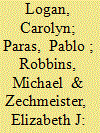|
|
|
Sort Order |
|
|
|
Items / Page
|
|
|
|
|
|
|
| Srl | Item |
| 1 |
ID:
171277


|
|
|
|
|
| Summary/Abstract |
Data quality in survey research remains a paramount concern for those studying mass political behavior. Because surveys are conducted in increasingly diverse contexts around the world, ensuring that best practices are followed becomes ever more important to the field of political science. Bringing together insights from surveys conducted in more than 80 countries worldwide, this article highlights common challenges faced in survey research and outlines steps that researchers can take to improve the quality of survey data. Importantly, the article demonstrates that with the investment of the necessary time and resources, it is possible to carry out high-quality survey research even in challenging environments in which survey research is not well established.
|
|
|
|
|
|
|
|
|
|
|
|
|
|
|
|
| 2 |
ID:
120910


|
|
|
|
|
| Publication |
2012.
|
| Summary/Abstract |
In February 2011, Ugandan President Yoweri Museveni resoundingly won re-election. In the aftermath of the vote, which many had predicted would be competitive, analysts and opposition supporters ascribed Museveni's victory to massive pre-election spending on public goods, creation of new administrative districts, and vote buying. While the opposition could not compete with Museveni and his National Resistance Movement in access to resources, our analyses of survey data, from two pre-election surveys conducted by Afrobarometer in November/December 2010 and January 2011, and a pre- and post-election panel study, find little evidence that Museveni benefited significantly from public goods outlays, district creation, and vote buying. Additionally, we find little evidence that fear and intimidation were responsible for the results. Instead, the data suggest that Museveni's re-election was driven by an uninspiring opposition slate, widespread satisfaction with macro-economic growth, and an improved security situation, particularly in the Northern Region.
|
|
|
|
|
|
|
|
|
|
|
|
|
|
|
|
| 3 |
ID:
120982


|
|
|
|
|
| Publication |
2013.
|
| Summary/Abstract |
African traditional authorities have proved to be highly resilient, remaining just as much a part of the 'modern' political landscape as any legislature or local council. Analysts draw sharply different conclusions as to whether this resilience is rooted in popular legitimacy, or whether it instead derives from either state sanction or state weakness. In short, the question is whether traditional authorities survive and thrive because of the preferences of the mass public, or only at the behest of the state, and in fact in opposition to the popular will. Data collected in 19 countries reveal an intensity of support for traditional authorities that challenges those who argue that these leaders are unwanted and undemocratic. While Africans find these leaders to be flawed, they enjoy widespread popular legitimacy, and most believe that traditional authorities have an important role to play in local governance. The public values the role traditional authorities play in managing and resolving conflict, and their leadership qualities and accessibility to ordinary people. Evidence also suggests that traditional leaders play an important symbolic role as representatives of community identity, unity, continuity, and stability.
|
|
|
|
|
|
|
|
|
|
|
|
|
|
|
|
| 4 |
ID:
089474


|
|
|
|
|
| Publication |
2009.
|
| Summary/Abstract |
The long-standing debate about the proper role for Africa's traditional leaders in contemporary politics has intensified in the last two decades, as efforts to foster democratisation and decentralisation have brought competing claims to power and legitimacy to the fore, especially at the local level. Questions persist as to whether traditional authority and democratic governance are ultimately compatible or contradictory. Can the two be blended into viable and effective hybrid systems? Or do the potentially anti-democratic features of traditional systems present insurmountable obstacles to an acceptable model of integration? Survey data collected by the Afrobarometer indicate that Africans who live under these dual systems of authority do not draw as sharp a distinction between hereditary chiefs and elected local government officials as most analysts would expect. In fact, popular evaluations of selected and elected leaders are strongly and positively linked. They appear to be consistently shaped by each individual's 'leadership affect', and by an understanding of chiefs and elected officials as common players in a single, integrated political system, rather than as opponents in a sharply bifurcated one. Moreover, there is no evident conflict between supporting traditional leadership and being a committed and active democrat. Rather than finding themselves trapped between two competing spheres of political authority, Africans appear to have adapted to the hybridisation of their political institutions more seamlessly than many have anticipated or assumed.
|
|
|
|
|
|
|
|
|
|
|
|
|
|
|
|
|
|
|
|
|